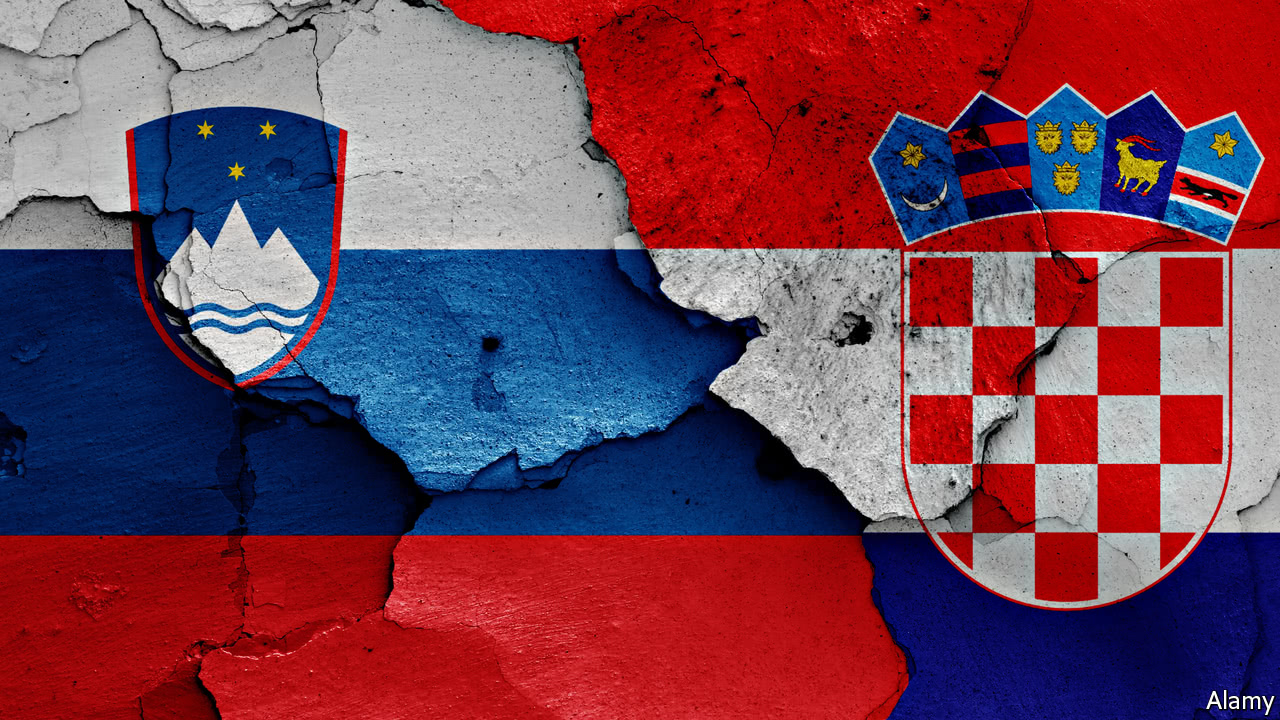by T.J.
 COUNTRIES are supposed to sort out border disputes before they join the European Union (EU). Slovenia and Croatia did not and that failure has returned to haunt them. Since December 29th hackles in the northern Adriatic have risen. Tiny police launches are puttering about menacingly on the Bay of Piran, where the two countries are disputing the position of their shared maritime frontier. Nationalists on both sides have been demanding that not an inch should be ceded. The police boats could conceivably start ramming each other. Whatever they do, the dispute serves as a reminder that EU membership offers no guarantee that perfectly resolvable border arguments will be sorted out sensibly. After all, these are not the Golan Heights.
COUNTRIES are supposed to sort out border disputes before they join the European Union (EU). Slovenia and Croatia did not and that failure has returned to haunt them. Since December 29th hackles in the northern Adriatic have risen. Tiny police launches are puttering about menacingly on the Bay of Piran, where the two countries are disputing the position of their shared maritime frontier. Nationalists on both sides have been demanding that not an inch should be ceded. The police boats could conceivably start ramming each other. Whatever they do, the dispute serves as a reminder that EU membership offers no guarantee that perfectly resolvable border arguments will be sorted out sensibly. After all, these are not the Golan Heights.
When Yugoslavia began self-destructing in 1991 (the year when both Slovenia and Croatia declared independence) the then European Community set up an arbitration commission. It ruled that the boundaries of Yugoslavia’s constituent republics should be the national frontiers of any newly independent states. But whereas Yugoslavia’s external frontiers were clear, the borders of the republics were not always so. There were plenty of places where their exact location was both unclear and never previously relevant. For an independent Slovenia, the location of its maritime border between Croatia and Italy is of particular importance, though. It determines Slovenia’s access from its coastal waters to international waters further out in the Adriatic.
Having joined the EU in 2004, Slovenia blocked Croatia’s accession in a bid to force its neighbour to accept various border proposals. In 2009 Slovenia lifted its veto as both countries agreed to arbitration (and Croatia joined the union in 2013). But in 2015, after details were leaked of conversations between a Slovene government lawyer and the Slovene judge on the arbitration commission, Croatia abandoned the process. Nevertheless, the tribunal continued its work and delivered rulings in June 2017 on 29 scraps of land and on the maritime border. Despite the Croats’ non-involvement, it gave both parties six months to implement them, a period that ended on December 29th. The disagreement is most acute in the Bay of Piran, which was previously cut in half by the maritime boundary. The tribunal gave the Slovenes 80% of the bay, and its government has threated to fine Croatian fishermen who venture over the line. With Croatia’s government weak and Slovenia’s facing elections, a deal is unlikely.
The danger is that the victims, apart from a few Croatian fishermen, will be bystanders. Croatia also has boundary disputes with Montenegro, Bosnia-Herzegovina and Serbia. On January 8th the president of the European Commission, Jean-Claude Juncker, said it would never again repeat the mistake it had made with Slovenia and Croatia and allow accession for countries with unresolved border issues. And sorting out these Balkan disagreements will not be easy. Nationalists on all sides will be guarding every inch of marsh and rock sticking out of the sea. Highlighting these absurdities, a Czech has declared the independent state of Liberland on a disputed patch on the Croatian-Serbian border. More seriously, the EU is refusing to give 1.8m Kosovars visa-free travel to the rest of Europe, in part because its government will not ratify an agreement on its border with Montenegro.
No comments:
Post a Comment